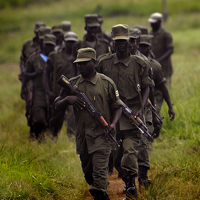Editor's note: This is the fourth of a five-part series examining security and development aid in East Africa. Part I provided an overview of the challenges facing East Africa. Part II examined the overlap between public health and security challenges. Part III examined the overlap between small-arms trafficking and WMD nonproliferation. Part IV examines the overlap between counterterrorism and efforts to contain criminal violence. Part V will provide success stories for the security-development model and discuss next steps.
On July 11, 2010, bombs ripped through crowds gathered to watch the World Cup soccer final in downtown Kampala, Uganda, leaving 76 dead and 85 wounded. Al-Shabaab, a Somalia-based terrorist organization, quickly claimed responsibility, asserting that the attack was in response to Uganda's support for the African Union's U.N.-backed peacekeeping mission in Somalia. The attack constituted al-Shabaab's first major assault beyond Somalia and the deadliest in East Africa since the 1998 U.S. Embassy bombings. It opened a new chapter for the region, raising the prospects of increased insecurity and regional instability, while simultaneously dealing a significant blow to prospects for economic growth and development.
Since the Kampala attacks, cross-border skirmishes and the threat of terrorist attacks by Somalia-based operatives have been an increasing concern for East Africa. In December, al-Shabaab took responsibility for the bombing of a Nairobi bus station that killed three.

